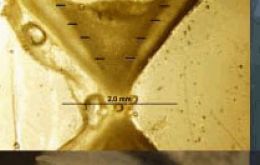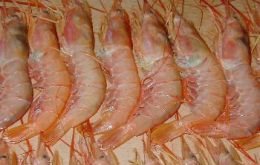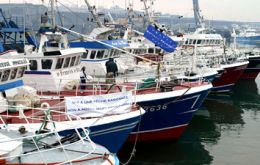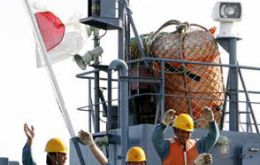MercoPress. South Atlantic News Agency
Fisheries
-
Monday, April 27th 2009 - 13:51 UTC
New hope for the “critically endangered” grey whales

Conservation campaigners are hailing a victory for the “critically endangered” grey whale. The groups have won agreement from some oil and gas companies in Russian waters to end seismic work, giving grey whales a chance to breed undisturbed.
-
Sunday, April 26th 2009 - 17:12 UTC
Skate recovered three years after tagging in the Falkland's waters

THE fishery around the Falkland Islands is rich and diverse, with the main fisheries focussed on a variety of squid and finfish. Furthermore, the area is also widely inhabited by a number of skate species, a family closely related to sharks.
-
Friday, April 24th 2009 - 04:51 UTC
EC determined to radical fisheries reform and lower catch capacity

The European Commission (EC) has raised the issue of radically reforming the European Union (EU) Common Fisheries Policy (CFP) to Member States, in favour of an important reduction of the fishing capacity, among other points.
-
Wednesday, April 22nd 2009 - 02:10 UTC
Argentine fish and shellfish exports pick up in first quarter

Argentina exported 88.987 tons of fish and shellfish valued at 209.3 million US dollars in the first three months of 2009, according to the latest statistics from the National Food Safety and Quality Service (SENASA).
-
Friday, April 17th 2009 - 07:25 UTC
French fishermen suspend blockade of English Channel ports

French fishermen suspended their blockade at three English Channel ports Thursday, allowing ferry traffic and freight to move through after two days of disruption, union leaders said.
-
Thursday, April 16th 2009 - 12:00 UTC
Fishing quotas dispute forces cancelling of Dover/Calais ferries

Ferry operator P&O has cancelled all Dover to Calais crossings due to a blockade by French fishing boats. The blockade at the port of Calais is also causing motorway disruption in Kent, police have said.
-
Wednesday, April 15th 2009 - 05:14 UTC
French fishermen block Channel ports to protests EU quotas

French fishing boats have mounted a blockade of three Channel ports, interrupting ferry and freight traffic in a dispute over fishing quotas. At Calais, Boulogne and Dunkirk fishing fleets are preventing ships entering or leaving the harbour.
-
Tuesday, April 14th 2009 - 13:33 UTC
Japanese whaling fleet limps back home with lower catch

Japan’s Fisheries Agency said on Monday ships from the country’s whaling fleet returned to port from the Antarctic Ocean with a lower catch than planned after being harassed by anti-whaling campaigners. The agency also indicated that several ships report some damage from clashes with the conservationists.
-
Thursday, April 9th 2009 - 21:20 UTC
EC to announce new strategy to revive fish farming industry

The European Commission is expected to unveil this week a new strategy to revive the fish farming industry. At a time when stocks of some species of fish in the world's oceans are dangerously low, the authorities in Brussels are concerned that Europe's aquaculture sector has stagnated.
-
Wednesday, April 8th 2009 - 01:14 UTC
Illex squid ‘no show’ for Falklands zones

The Illex fishery has been a “no show” for Falkland Islands zones so far this year, confirmed Director of Fisheries John Barton.
